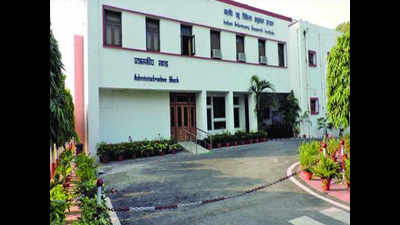- News
- City News
- bareilly News
- Fever deaths in Bareilly: IVRI to do research on ‘monkey malaria’
Trending
This story is from September 30, 2018
Fever deaths in Bareilly: IVRI to do research on ‘monkey malaria’

The health department has also asked veterinary and forest departments to take blood samples of monkeys in Aonla sub-division, which is the worst-affected area
BAREILLY: After 7,862 cases of deadly plasmodium falciparum malaria and 14,988 cases of plasmodium vivax malaria were reported in Bareilly district, the health department has asked scientists at Indian Veterinary Research Institute (IVRI) to conduct a research on ‘monkey malaria’. The health department has also asked veterinary and forest departments to take blood samples of monkeys in Aonla sub-division, which is the worst-affected area.The department wants to rule out the possibility of plasmodium knowlesi, which is a malaria parasite in monkeys found in Southeast Asia.
Dr Pramila Gaur, additional director (health), Bareilly division, who sent letters to departments concerned on Saturday said, “Monkeys and humans have similar genes. We want a study to be conducted to eliminate the possibility that monkeys might be the source of malaria among humans. The study will be helpful in dealing with malaria cases in the future.”
Dr Deepak Kumar, entomologist, said there was a possibility that monkeys were hosts of parasites from female anopheles mosquitoes. “No study on monkey malaria has been conducted in this region and this research can turn out to be important,” he added.
According to World Health Organisation, humans can be infected with monkey malaria parasite while staying in rainforests or their fringe areas in Southeast Asia, within the range of the natural monkey hosts and mosquito vector of this infection. The parasite has a life-cycle of 24 hours and can give rise to daily fever spikes occurring 9–12 days after infection.
IVRI director RK Singh told TOI, “If the forest department catches monkeys, our scientists will take blood samples from the animals. We can declare the results of the tests on the samples on the same day.”
Dr Dinesh Chandra, head of division of parasitology at IVRI said, “A team of researchers had found monkey malaria in humans on Andaman and Nicobar Islands. There are low chances that the malaria parasite would be present in monkeys in Bareilly but we will conduct research in the matter. We have taken the opinion of retired doctor YD Sharma who was part of the team which found plasmodium knowlesi in tribal populations in Andamans.”
Dr Pramila Gaur, additional director (health), Bareilly division, who sent letters to departments concerned on Saturday said, “Monkeys and humans have similar genes. We want a study to be conducted to eliminate the possibility that monkeys might be the source of malaria among humans. The study will be helpful in dealing with malaria cases in the future.”
Dr Deepak Kumar, entomologist, said there was a possibility that monkeys were hosts of parasites from female anopheles mosquitoes. “No study on monkey malaria has been conducted in this region and this research can turn out to be important,” he added.
According to World Health Organisation, humans can be infected with monkey malaria parasite while staying in rainforests or their fringe areas in Southeast Asia, within the range of the natural monkey hosts and mosquito vector of this infection. The parasite has a life-cycle of 24 hours and can give rise to daily fever spikes occurring 9–12 days after infection.
TOI had earlier reported that of the total malaria cases, nearly 80 to 90% are being detected only in Aonla sub-division. Bharat Lal, divisional forest officer said, “No survey has been done in Aonla to determine the number of monkeys. We will catch monkeys after we get approval from principal chief conservator of forests.”
IVRI director RK Singh told TOI, “If the forest department catches monkeys, our scientists will take blood samples from the animals. We can declare the results of the tests on the samples on the same day.”
Dr Dinesh Chandra, head of division of parasitology at IVRI said, “A team of researchers had found monkey malaria in humans on Andaman and Nicobar Islands. There are low chances that the malaria parasite would be present in monkeys in Bareilly but we will conduct research in the matter. We have taken the opinion of retired doctor YD Sharma who was part of the team which found plasmodium knowlesi in tribal populations in Andamans.”
End of Article
FOLLOW US ON SOCIAL MEDIA










